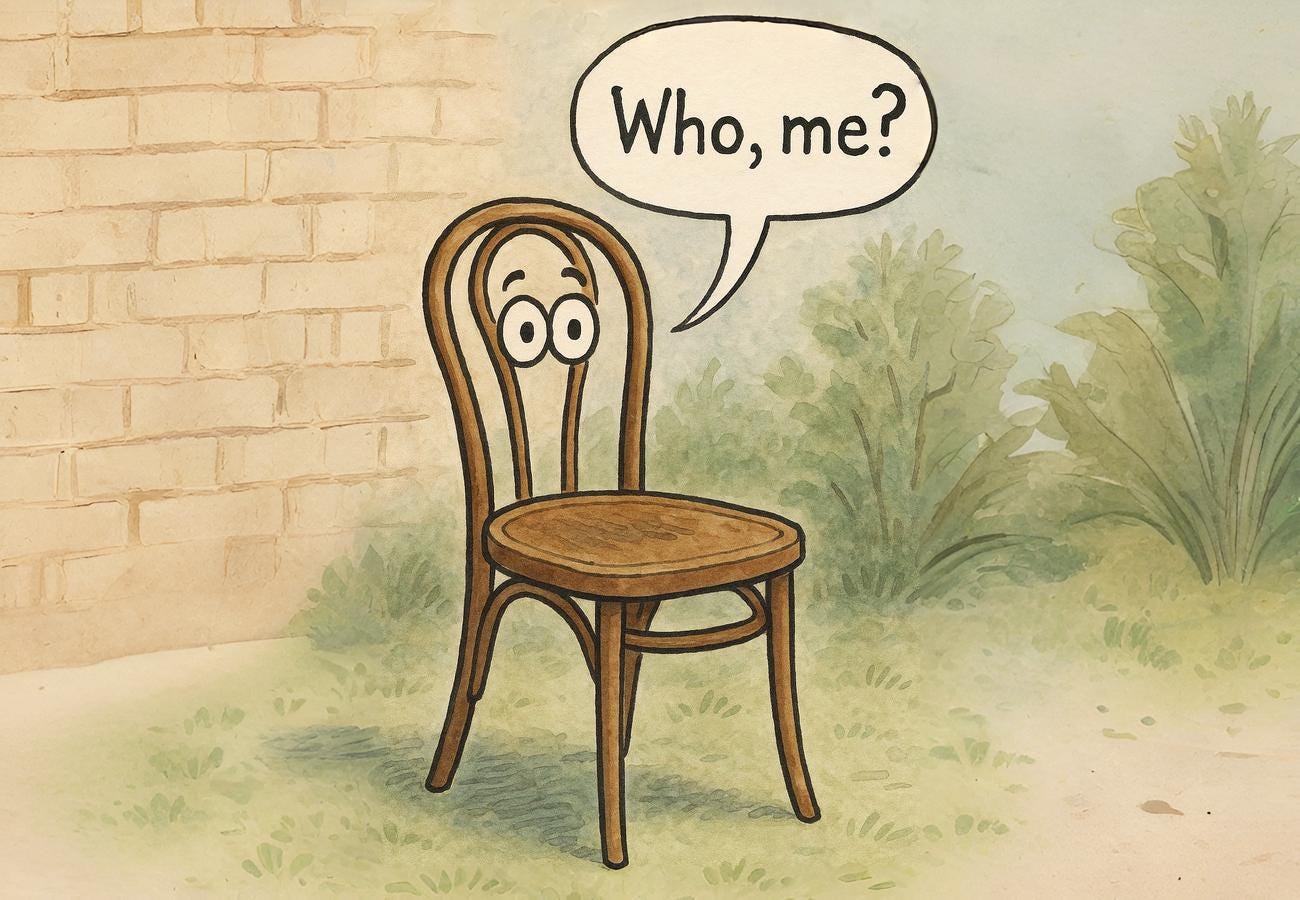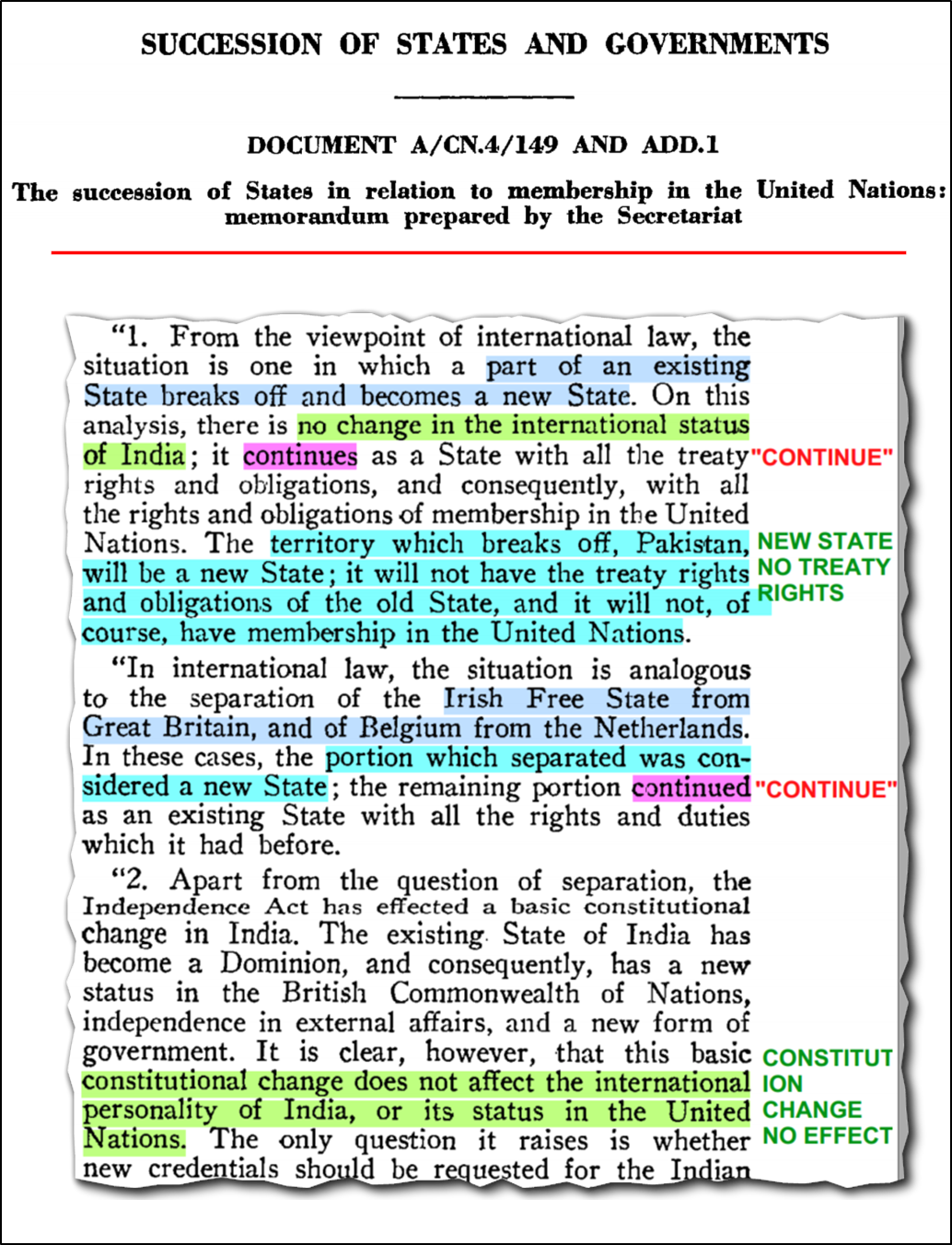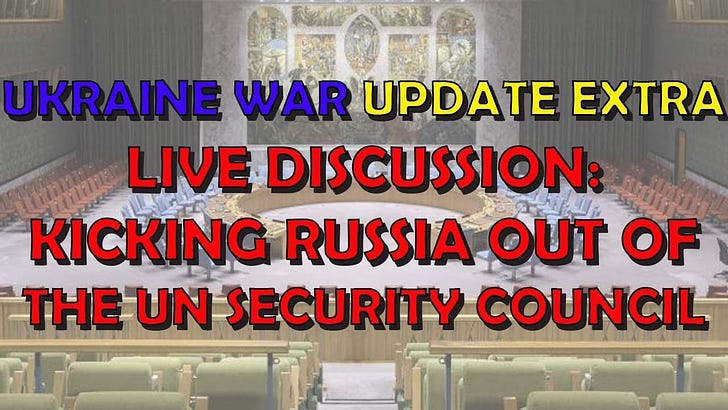"Seats" in the United Nations - a vexed concept which applies to only 10 memberships | Knowledge is Power
"Seat" has been deliberately misused to mislead that Russia could sit in the UN memberships of another state, the USSR, like chairs. Memberships are not "seats". They end when a state ceases to exist.
Countries’ memberships of the United Nations, and the permanent memberships of the Security Council cannot be transferred like “seats”. They attach to states themselves, and end when a state ceases to exist. READ IT TO THE END! 💥
Switching language from “membership” to “seat” is not harmless shorthand — it’s a tool of strategic misrepresentation. Which has been used to deceive the world for 3 decades.
Listen to audio playback of this article here (button is at top right)
A seat is an object which exists on its own, and can be used by different users, bought and sold.
There are plenty of those in the United Nations, but they don’t have voting rights.
A membership is not an object. It is the status of an individual entity or person, a relationship of inclusion, being a part of, an organisation — like the United Nations, or a category — such as the human race, or a crowd.
Oxford Dictionary of Law:
“The state of belonging to a particular group, especially a corporate body, club, or association. Membership usually gives rise to certain rights and duties as defined in the constitution or rules of the body.”
Halsbury’s Laws of England (Company Law, Vol. 6):
“Membership in a company or association arises through admission in accordance with its rules and confers rights and duties that continue during life or until resignation or removal, unless otherwise provided.”
Organisations often give their members a right to participate and vote. Those rights are given to UN members by the United Nations Charter.
Organisations make rules on who can be members and how they can become members. Article 4 of the Charter provides that only countries can be members — not governments or representatives. Admission to UN membership requires decisions by the existing members, and its Security Council.

An organisation’s rules may provide for transfers of its memberships, or legislation may create transfer rights (such as shareholders’ rights in companies). Inheritance is just a specific type of transfer. There is no automatic right — in any of the world’s legal systems — to transfer or inherit memberships, unless such rights are specifically created.
The UN Charter doesn’t have to “forbid” transfers, because members have no powers or rights except what the organisation explicitly gives them. The Charter does not allow transfer of UN memberships, for obvious reasons: the core UN principle of sovereign equality of states, and the limitation of membership to peace-loving states willing and able to carry out their obligations, would be destroyed if memberships could be transferred. It would open the door to rogue states acquiring memberships by deception, coercion, or even force. With dire consequences like those the world is witnessing now.
Why some memberships are like seats
There are two types of memberships. Temporary appointed memberships, and permanent personal memberships.
The term “seat”, referring to a place to sit at meetings, is slang, often used for membership of elected bodies such as Parliaments or committees where the membership holder is temporary and changes by election or appointment. This word has been exploited to give a false perception of United Nations memberships and permanent memberships of its Security Council. Which are nothing of the kind.
Article 23 of the UN Charter creates 10 elected non-permanent memberships of its Security Council (highlighted in yellow in the image below)
It also appoints 5 named countries as permanent members (highlighted in blues).
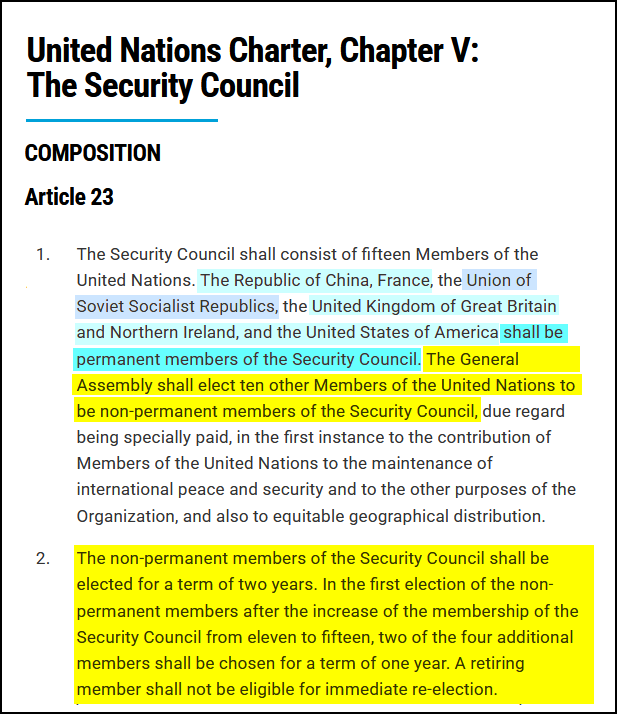
The 10 non-permanent memberships could be nicknamed “seats”, because, like memberships of most committees, they are filled by elections and survive after they are vacated, to be filled again.
But even those “seats” cannot be acquired in any way except by the prescribed process — in the case of parliaments, by valid elections, and in the case of the non-permanent Security Council memberships, by the election procedure set out in Article 23 of the Charter.
UN memberships and permanent Security Council memberships are not “seats”. No other country can use them.
Apart from those 10 memberships, the United Nations Charter does not recognize the concept of a "seat" capable of being vacant, or transferred, in its general memberships or permanent Security Council memberships.
Those memberships are attached to specific named states — not to "seats", governments or representatives.
Changes of government of a state, changes of the representatives they use, and changes of a country’s name are their internal business and do not “transfer” the state’s membership, the first two only transfer the authority to exercise it. They simply notify the UN and it updates its records, after ensuring that the notice is properly authorised. (Which was not done when the USSR’s name was changed to the “Russian Federation” in the UN’s records, and a representative of a different country was recognised — when the USSR had neither changed its name nor given any notice to the UN.)
Russia and its supporters have misled the world that the UN “transferred a ‘seat’ from Taiwan to the Peoples Republic of China” in 1971. That is totally untrue. Taiwan has never been a member of the United Nations — Chiang Kai-shek, who moved to Taiwan after his government was defeated in China, was claiming China’s membership. China had always been, and remains, the UN member state. The UN simply passed a resolution recognising the actual government of China, which calls itself the People’s Republic of China, the same way the current administration of the United States calls itself Republicans. The resolution expelled the representatives of the ousted government. They were “unlawfully present”, as they did not represent any member state. Taiwan was not mentioned.
Because the UN Charter does not permit transfers (including “inheritance”), the named UN memberships and Permanent Memberships of the Security Council are personal and can never be transferred to or “inherited” by another country.
UN memberships end if the member ceases to exist
While the 10 Security Council non-permanent memberships are limited to two years, the named states’ memberships are not limited. As explained in Halsbury’s Laws of England, their memberships “continue during life”. When states’ lives end — that is, they cease to exist — as the USSR and a number of other states such as Czechoslovakia and the Socialist Federal Republic of Yugoslavia have — their memberships stop continuing. They end, along with the state.
The confusion has been caused by calling those personal, named states’ memberships “seats”. You don’t call your personal membership of your government’s electoral roll a “seat”, although you might call it a “vote”. “Seat” is loose slang, not a description of rights.
Conclusion: the Russian Federation does not have a “seat”.
There’s no dispute that the Russian Federation has never applied for membership as required by the UN Charter. That procedure would not give Boris Yeltsin the ‘veto’ power attached to the Security Council permanent membership, given to the USSR in 1945 when the Charter was signed. Someone wanted him to have it.
Russia and its supporters claim variously that Russia “assumed” or “continued” “seats” in the United Nations. They couldn’t claim succession or inheritance1; so Boris Yeltsin wrote a letter2 “informing” the UN Secretary-General that Russia was “continuing3” the USSR’s memberships.
But, as we have seen, the USSR’s memberships were not “seats” at all. They were non-transferable named memberships attached to the USSR itself, which had ended, beyond any hope of resuscitation, when the USSR ceased to exist on 21 December 19914. There was nothing for Russia to “continue”, or “assume” on 24 December when Boris Yeltsin sent his letter.5
To add insult to deceit, Russia and its supporters then tried to get over that hurdle by claiming Russia somehow “was” the USSR, that the USSR somehow “continued” to exist after it had ceased to exist.
Unfortunately for this argument, Russia seceded from the USSR before the USSR ceased to exist, and gave notice of it to the UN6. They became two separate unrelated countries. The breakaway Russia, a non-member of the UN — like Pakistan which had to apply for membership after it seceded from India7 — while the USSR continued, as itself, with 8 remaining member republics, exercising its UN memberships including presiding over meetings of the Security Council8, until those remaining members abolished it9. That is the meaning of the word “continue”. The word has simply been hijacked.
Russia could not possibly “continue” a membership of a state it had nothing to do with. It might as well have tried to “continue“ the membership of the Socialist Federal Republic of Yugoslavia when that ceased to exist.
Like the representatives of China’s ousted government in 1971, Russia’s representatives are “unlawfully present” — they do not represent any member state. The procedure used in 197110 can, and must, be used to expel them. Until that is done, the UN is contravening its own Charter.11
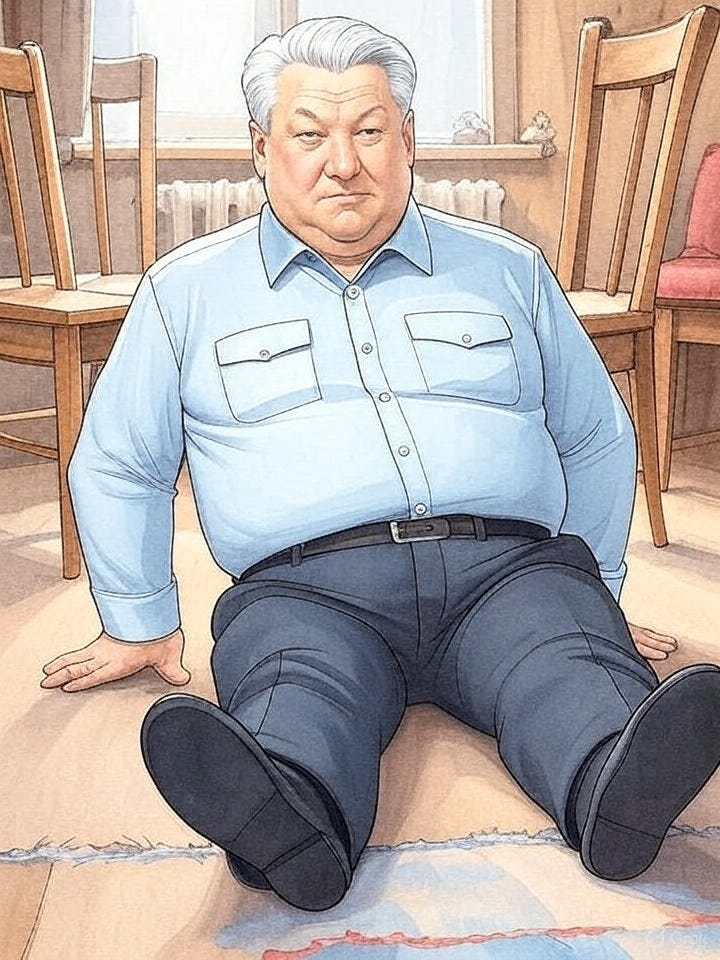
Now you know the truth, sign the petition! #RussiaUNFraudPetition.
“Succession” has a specific legal meaning. It refers only to changes of which state is legally responsible for a specified territory. Not to treaty rights such as trade, or memberships.
As to “inheritance”: as a type of transfer, in the absence of a specific provision in an organisation’s rules, or government legislation, there is no inheritance of memberships under the general law in any legal system. The UN helpfully issued a declaration in 1947, removing any argument on the law—
"to which, in the future, a State or States entering into international life through the division of a Member State of the United Nations should be subject":
“1. …the extinction of the State as a legal personality recognized in the international order must be shown before its rights and obligations can be considered thereby to have ceased to exist.
“2. That when a new State is created, … whether or not they formed part of a State Member of the United Nations, it cannot … claim the status of a Member … unless it has been formally admitted … in conformity with the provisions of the Charter.”
The letter was hidden until 2022. It was never issued as a UN document.
So — where does “continue” come from? It comes from the first part of the of the law on division of states (above):
“… a State … does not cease to be a member simply because its Constitution or its frontier have been subjected to changes“
So that when part of a state breaks away (secedes), the original state continues, while the breakaway state becomes a “new” state in international law. The USSR continued itself, after Russia left it. Russia was a “new” breakaway state, not the continuing state! There is no such thing as “continuing” a different state.
A full discussion is set out in Status of the former USSR's UN memberships, and legality of Russia's claim to it | Why Russia is not a member of the United Nations.
Russia, Ukraine and Belarus leave the USSR: Belavezha Accord signed 8 December 1991, UN notice dated 12 December 1991 circulated to the members 13 December 1991
Notice circulated in the UN of the abolition of the USSR on 21 December 1991: 1991-12-27 A/47/60 ✔ALMA ATA PROTOCOLS LF BELARUS 1991-12-27 Development and strengthening of good-neighbourliness between States
Expulsion of Chiang Kai Shek’s Republic of China delegation - it did not represent any member state, as Taiwan had never been a UN Member: 1971-10-25 UN 2758 SCAN ''Restoration of the lawful rights of the People's Republic of China in the United | A_RES_2758(XXVI)-EN.pdf
For the step-by-step full evidence and law, and how fast, easy and certain the remedy is, see:



